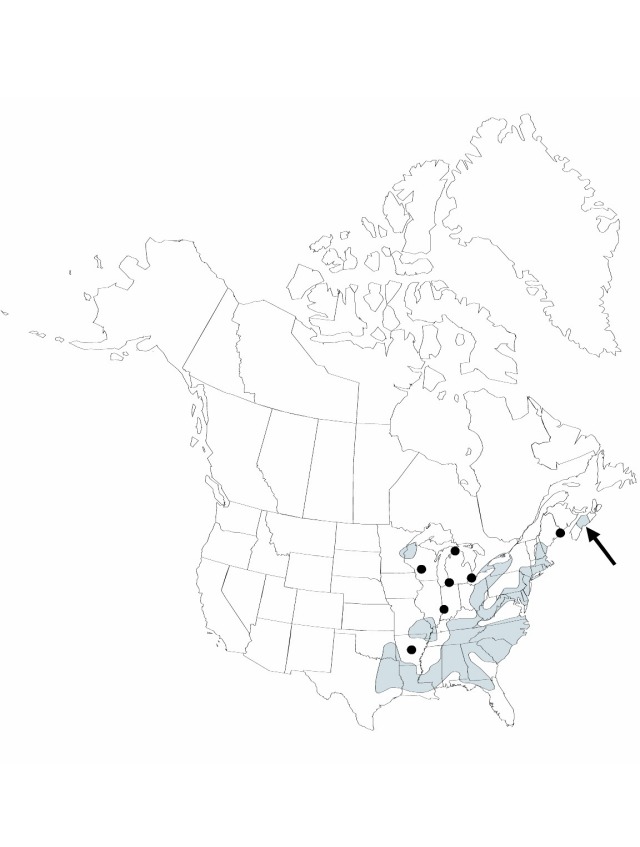Difference between revisions of "Potamogeton pulcher"
American Journal of Science, and Arts 45:38. 1843.
FNA>Volume Importer |
imported>Volume Importer |
||
| (6 intermediate revisions by 2 users not shown) | |||
| Line 8: | Line 8: | ||
}} | }} | ||
|common_names=Spotted pondweed;potamot gracieux | |common_names=Spotted pondweed;potamot gracieux | ||
| + | |special_status={{Treatment/ID/Special_status | ||
| + | |code=E | ||
| + | |label=Endemic | ||
| + | }} | ||
|basionyms= | |basionyms= | ||
|synonyms= | |synonyms= | ||
| Line 24: | Line 28: | ||
|elevation=0–700 m | |elevation=0–700 m | ||
|distribution=N.B.;N.S.;Ont. ;P.E.I.;Ala.;Ark.;Conn.;Del.;Fla.;Ga.;Ill.;Ind.;Ky.;La.;Maine;Md.;Mass.;Mich.;Minn.;Miss.;Mo.;N.H.;N.J.;N.Y.;N.C.;Ohio;Okla.;Pa.;R.I.;S.C.;Tenn.;Tex.;Va.;W.Va.;Wis. | |distribution=N.B.;N.S.;Ont. ;P.E.I.;Ala.;Ark.;Conn.;Del.;Fla.;Ga.;Ill.;Ind.;Ky.;La.;Maine;Md.;Mass.;Mich.;Minn.;Miss.;Mo.;N.H.;N.J.;N.Y.;N.C.;Ohio;Okla.;Pa.;R.I.;S.C.;Tenn.;Tex.;Va.;W.Va.;Wis. | ||
| − | |discussion=<p>Potamogeton pulcher is similar in morphology to P. amplifolius and occurs in similar habitats. Potamogeton pulcher differs from P. amplifolius by the former having lanceolate to linear-lanceolate submersed leaves with fewer than 19 veins, whereas the latter has ovate submersed leaves with more than 19 veins.</p> | + | |discussion=<p><i>Potamogeton pulcher</i> is similar in morphology to <i>P. amplifolius</i> and occurs in similar habitats. <i>Potamogeton pulcher</i> differs from <i>P. amplifolius</i> by the former having lanceolate to linear-lanceolate submersed leaves with fewer than 19 veins, whereas the latter has ovate submersed leaves with more than 19 veins.</p> |
|tables= | |tables= | ||
|references= | |references= | ||
| Line 33: | Line 37: | ||
-->{{#Taxon: | -->{{#Taxon: | ||
name=Potamogeton pulcher | name=Potamogeton pulcher | ||
| − | |||
|authority=Tuckerman | |authority=Tuckerman | ||
|rank=species | |rank=species | ||
| Line 47: | Line 50: | ||
|publication title=American Journal of Science, and Arts | |publication title=American Journal of Science, and Arts | ||
|publication year=1843 | |publication year=1843 | ||
| − | |special status= | + | |special status=Endemic |
| − | |source xml=https:// | + | |source xml=https://bitbucket.org/aafc-mbb/fna-data-curation/src/2e0870ddd59836b60bcf96646a41e87ea5a5943a/coarse_grained_fna_xml/V22/V22_335.xml |
|genus=Potamogeton | |genus=Potamogeton | ||
|species=Potamogeton pulcher | |species=Potamogeton pulcher | ||
Latest revision as of 20:30, 5 November 2020
Rhizomes present. Cauline stems terete, conspicuously spotted, 8–95 cm; nodal glands absent. Turions absent. Leaves both submersed and floating, ± spirally arranged. Submersed leaves petiolate, lax; stipules deliquescent, inconspicuous, convolute, free from blade, light to dark brown, not ligulate, 0.7–1.2 cm, not fibrous, not shredding at tip, apex obtuse; petioles 0.5–4.5 cm; blade dark green, linear-lanceolate to lanceolate, often arcuate, 3.5–13.8 cm × 60–165 mm acute, base acute to rounded, without basal lobes, margins entire, crispate, apex not hoodlike, acute to obtuse, lacunae in 2–5 rows each side of midrib; veins 7–19. Floating leaves: petioles continuous in color to apex, 1–16.5 cm; blade adaxially light to dark green, lanceolate to round-ovate, 2.5–8.5 cm × 11–44 mm, base rounded to cordate, apex acute to rounded; veins 15–21. Inflorescences unbranched, emersed; peduncles not dimorphic, terminal or axillary, erect to ascending, cylindric, 3.3–9.4 cm; spikes not dimorphic, cylindric, 17–36 mm. Fruits sessile, dark green to dark brown, ovoid to obovoid, turgid, abaxially keeled, laterally ridged, 5–6.5 × 4.1–5 mm, lateral ridges without points; beak erect, 0.5 mm; embryo with 1 full spiral. Chromosome number apparently unknown not available.
Phenology: Flowers summer–fall.
Habitat: Stagnant to slow-flowing waters of streams, lakes, ponds, and small rivers
Elevation: 0–700 m
Distribution

N.B., N.S., Ont., P.E.I., Ala., Ark., Conn., Del., Fla., Ga., Ill., Ind., Ky., La., Maine, Md., Mass., Mich., Minn., Miss., Mo., N.H., N.J., N.Y., N.C., Ohio, Okla., Pa., R.I., S.C., Tenn., Tex., Va., W.Va., Wis.
Discussion
Potamogeton pulcher is similar in morphology to P. amplifolius and occurs in similar habitats. Potamogeton pulcher differs from P. amplifolius by the former having lanceolate to linear-lanceolate submersed leaves with fewer than 19 veins, whereas the latter has ovate submersed leaves with more than 19 veins.
Selected References
None.